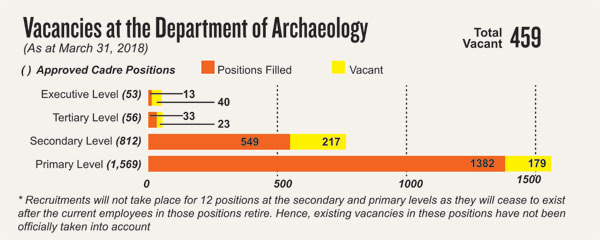News
Big holes in cadre from top to bottom leave Archaeology Dept.teetering
View(s):The Department of Archaeology is severely understaffed, with most of its top level positions being vacant. Senior officials there acknowledged that continuing shortfall at all levels of the department are hindering their efforts to protect and preserve archaeological sites around the country.
The situation persists despite a directive from President Maithripala Sirisena in January, last year, to take immediate steps to fill the vacant senior positions. According to statistics obtained by the Sunday Times through a Right to Information (RTI) 459 vacant positions remain across all different levels in the Department.
 The issue is most glaring at the executive level, with a majority of the senior positions being vacant. According to data released as per the RTI request, only 13 of the 53 positions at the executive level have been filled as at March 31, this year. Among the positions still vacant are eight of the nine Director posts. They include Exploration and Registration, Excavation, Museums, Maintenance, Project Planning & Monitoring, and Chemical Conservation.
The issue is most glaring at the executive level, with a majority of the senior positions being vacant. According to data released as per the RTI request, only 13 of the 53 positions at the executive level have been filled as at March 31, this year. Among the positions still vacant are eight of the nine Director posts. They include Exploration and Registration, Excavation, Museums, Maintenance, Project Planning & Monitoring, and Chemical Conservation.
Meanwhile, all 15 Deputy / Assistant Director (Regional) posts are yet to be filled. The three Deputy / Assistant Director (Exploration and Registration) posts are also vacant, as are the two positions of Deputy / Assistant Director (Excavation), and the two posts for Deputy / Assistant Director (Maintenance). Altogether, 27 Deputy / Assistant Director posts at the department are vacant. The department also has no Chief Engineer, Internal Auditor or Legal Officer.
At the tertiary level, which has an approved cadre of 56 posts, there are 23 vacancies, while 217 of the 812 positions at the secondary level are vacant. At the primary level, the department is short of 179 staff members.
Information released by the department as per the RTI request notes that regarding a significant number of positions, the Archaeological Department has requested the Ministry of Public Administration and Management to fill the vacancies. Approval has been sought from the Public Service Commission (PSC) and other relevant agencies to change the Scheme of Recruitment (SoR) due to insufficient number of qualified candidates. Meanwhile, a Fundamental Rights (FR) petition filed by some employees of the department has prevented the recruitment for deputy / assistant director posts until the conclusion of the case.
The situation has caused concern at the highest levels of government. So much so that in January, last year, President Sirisena chaired a special discussion at the Presidential Secretariat regarding protecting archaeological sites and antiquities. According to a media release issued by the President’s Media Unit (PMD) at the time, the President instructed the relevant authorities “to take immediate steps to fill the vacancies of senior officials at the Department of Archaeology.” The President had further said that this step should be taken immediately to eliminate the obstacles pertaining to archaeological issues and to protect archaeological sites.
The lack of senior officials at the department means that there aren’t enough officials to give junior officials the direction and guidance they need to carry out their work successfully, said a former senior official at the Department of Archaeology, who spoke on condition of anonymity. Without such direction, the department’s most important function, which is to safeguard the country’s archaeological treasures, inevitably suffers, the source added.
 The Ven. Ellawala Medhananda Thera, who has been studying and recording details of Buddhist archaeological sites around the country for decades, and who was among those who were present at last year’s meeting with President Sirisena, bemoaned the continued staff shortfall at the Archaeological Department.
The Ven. Ellawala Medhananda Thera, who has been studying and recording details of Buddhist archaeological sites around the country for decades, and who was among those who were present at last year’s meeting with President Sirisena, bemoaned the continued staff shortfall at the Archaeological Department.
“Due to a lack of experienced archaeologists, we have very young and inexperienced people handling artefacts, increasing the risks of them suffering damage,” the Thera observed. He said this was also contributing to what he claimed was an organised campaign to destroy Buddhist archaeological sites in the North and East. He said many of the incidents may be going unrecorded by police since the Archaeological Department had not identified the sites, mainly because it lacks the personnel required to verify their existence, and subsequently to protect these sites.
“The delays in recruitment are mainly due to procedural matters,” insisted Prof. P.B. Mandawala, Director General of Archaeology. The DG noted, that according to the existing SoR, officers must be promoted from within the department for the posts of director. “To fill the director posts, we have to promote our deputy / assistant directors, but they have to complete 15 years with the department to be eligible to hold a director post. As of now, we don’t have enough of them to promote,” he explained.
Given the difficulty, the department has written to the relevant authorities seeking permission for a one-time only exemption which would allow any qualified candidate from within the state service to apply for the posts. This however, would require approval from several agencies including the Wages Board and the PSC. The process is still ongoing.
A competitive examination was to be held by the Sri Lanka Institute of Development Administration on August 28, 2016 to recruit candidates for the 27 deputy / assistant director posts at the Department of Archaeology. A group of graduates within the department however, filed an FR petition with the Supreme Court challenging the recruitment process. The SC had thereafter issued an injunction preventing the examination from being held until the conclusion of the case. Prof. Mandawala, who was appointed as DG of the department in June, last year, said they made the necessary changes to the SoR to remove anomalies that would do injustice to these graduates and also held discussions with the department’s trade unions. “We have now sent the amended SoR to the PSC for approval and once it is received, we will go before the SC and lay out this solution.”
Graduates will have to be recruited to fill vacancies at the secondary level. Prof. Mandawala said, adding that they had already asked the relevant authorities for graduates. “We have however, made it clear that we wish to have those who have a degree in archaeology, given that this is a specialised field,” he pointed out.
Prof. Mandawala added that, except for the positions of director, moves are underway to get existing officials to cover up the work in other positions. For example, though all 15 positions of Deputy / Assistant Director (Regional) are vacant, Regional Officers (ROs) who are already permanently employed in various districts are covering these duties. “Nevertheless, issues regarding their authority when it comes to taking decisions do arise, and as such, most of the files come to my desk. Vacancies in such posts mean that a lot of the things that could normally be referred to a director by an assistant director go to the DG.”
At the primary level, the shortage of qualified masons and watchers was the main challenge. There are 35 vacancies for masons at the department. The position is important given the amount of restoration work that is taking place in archaeological sites. Nevertheless, qualified masons, who can earn about Rs.3000 a day, are reluctant to apply for a government position where they would have to settle for a monthly wage. The department also needs far more watchers to safeguard archaeological sites. Currently, the approved cadre of watchers is 150, though even here, there is a shortfall of 35. “But, in reality, our estimate is that we need some 2000 permanent watchers if we are to properly look after the archaeological sites. Therefore, we have made a request to increase the cadre numbers,” he emphasized.
Nevertheless, Prof. Mandawala strongly disputed claims of a campaign being waged to destroy Buddhist archaeological sites in the north and east. He noted that, according to reports received by police, there were 290 instances at archaeological sites being destroyed or vandalised last year. A majority of them were from Anuradhapura (81), Kurunegala (30) and Moneragala (28). In contrast, just three incidents have been reported from Batticaloa, two from Kilinochchi and one from Mullaitivu. There have been no reports from Jaffna or Mannar, he stated.

